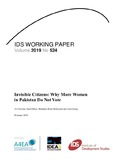Invisible Citizens: Why More Women in Pakistan Do Not Vote
| dc.contributor.author | Cheema, Ali | |
| dc.contributor.author | Khan, Sarah | |
| dc.contributor.author | Khan Mohmand, Shandana | |
| dc.contributor.author | Liaqat, Asad | |
| dc.coverage.spatial | Pakistan | en |
| dc.date.accessioned | 2019-02-20T12:13:04Z | |
| dc.date.available | 2019-02-20T12:13:04Z | |
| dc.date.issued | 2019-02-20 | |
| dc.identifier.citation | Cheema, A.; Khan, S.; Khan Mohmand, S. and Liaqat, A. (2019) Invisible Citizens: Why More Women in Pakistan Do Not Vote, IDS Working Paper 524, Brighton: IDS | en |
| dc.identifier.isbn | 978-1-78118-515-5 | |
| dc.identifier.issn | 2040-0209 | |
| dc.identifier.uri | https://opendocs.ids.ac.uk/opendocs/handle/20.500.12413/14352 | |
| dc.description.abstract | Why does a gender gap in voting exist in Pakistan? Our research looks beyond the creation of democratic spaces for women's participation, such as voter registration, to look instead at the constraints that women face in being able to use such spaces. This paper uses qualitative fieldwork undertaken in Lahore over 2017–18 to understand what enables or constrains women’s decision to turn out to vote. Standard explanations for Pakistan’s large gender gap in political participation highlight overt restrictions imposed on women voters by male family and community members. We do not believe that these explanations are complete and look instead at more subtle processes that socialise women into non-political roles, and result in a ‘gendered psyche’ that makes women feel invisible and irrelevant to the electoral process. Constraints resulting from political engagement are usually underemphasised in academic and policy literature, and analysing their importance is a major contribution of this paper. | en |
| dc.description.sponsorship | UK Department for International Development | en |
| dc.language.iso | en | en |
| dc.publisher | IDS | en |
| dc.relation.ispartofseries | IDS Working Paper;524 | |
| dc.rights | This is an Open Access paper distributed under the terms of the Creative Commons Attribution 4.0 International licence (CC BY), which permits unrestricted use, distribution, and reproduction in any medium, provided the original authors and source are credited and any modifications or adaptations are indicated. http://creativecommons.org/licenses/by/4.0/legalcode | en |
| dc.rights.uri | http://creativecommons.org/licenses/by/4.0/ | en |
| dc.subject | Gender | en |
| dc.subject | Participation | en |
| dc.subject | Politics and Power | en |
| dc.title | Invisible Citizens: Why More Women in Pakistan Do Not Vote | en |
| dc.type | IDS Working Paper | en |
| dc.rights.holder | IDS | en |
| dc.identifier.team | Power and Popular Politics | en |
| rioxxterms.funder | Default funder | en |
| rioxxterms.identifier.project | Default project | en |
| rioxxterms.version | VoR | en |
| rioxxterms.funder.project | 9ce4e4dc-26e9-4d78-96e9-15e4dcac0642 | en |
Files in this item
This item appears in the following Collection(s)
-
Pakistan - Governance [30]
-
Pakistan - Governance [30]
-
Pakistan - Governance [30]
-
Pakistan - Governance [30]
-
Pakistan - Governance [30]
-
Pakistan - Gender [14]
-
Action for Empowerment and Accountability Programme [126]
-
IDS Research [1671]
Except where otherwise noted, this item's license is described as This is an Open Access paper distributed under the terms of the Creative Commons Attribution 4.0 International licence (CC BY), which permits unrestricted use, distribution, and reproduction in any medium, provided the original authors and source are credited and any modifications or adaptations are indicated. http://creativecommons.org/licenses/by/4.0/legalcode


